Author(s) |
Title and Abstract |
Gumus, S., Sukru Bellibas, M., Sen, S., & Hallinger, P.
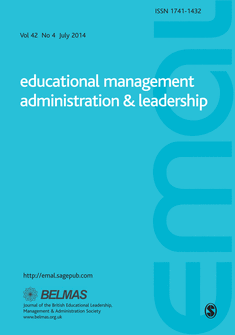
|
Finding the missing link: Do principal qualifications make a difference in student achievement?. Educational Management, Administration & Leadership. https://doi.org/10.1177/17411432211051909.
Abstract:
Despite the growing scholarly interest in the effects of principal leadership on student achievement, empirical evidence concerning how principal qualifications might be related to student learning outcomes has been limited. This study investigates the relationship between different principal qualifications (prior experience in teaching, principalship and other school management roles, formal education, principal training, and professional development) and student achievement by analyzing cross-national teaching and learning international survey and program on international student assessment data from seven countries. The results showed that experience in principalship and other school management positions, principal training, and participation in networking activities and teaching/pedagogy-focused seminars had small but statistically significant associations with student achievement, though the results were not consistent across different subjects. Level of education and years of teaching experience did not, however, predict student achievement. Implications of the findings are offered for policy and further research.
Keywords: Principal Qualifications, Principal Experience, Principal Preparation, Professional Development, Student Achievement.
|
Liu, S., Lu, J.,
& Yin, H.
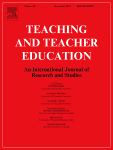
|
Can professional learning communities promote teacher innovation? A multilevel moderated mediation analysis. Teaching and Teacher Education. https://doi.org/10.1016/j.tate.2021.103571
Abstract:
This study developed and tested a multilevel moderated mediation model to examine teacher creative self-efficacy as a mediator and innovative climate as a moderator in the relationship between professional learning communities (PLCs) and teacher innovation. Using a sample of 3419 senior high school teachers in mainland China, we found that teacher creative self-efficacy mediated the PLCs-teacher innovation relationship, while innovative climate moderated the effects of PLCs on both teacher creative self-efficacy and teacher innovation. These results help clarify how (i.e., through teacher creative self-efficacy) and when (i.e., high innovative climate) the effects of PLCs on teacher innovation are strengthened. Keywords: Professional learning communities, Teacher innovation, Teacher creative self-efficacy, Innovative climate, Multilevel moderated mediation.
|
Poudel, P. P.,
& Choi, T.-H.
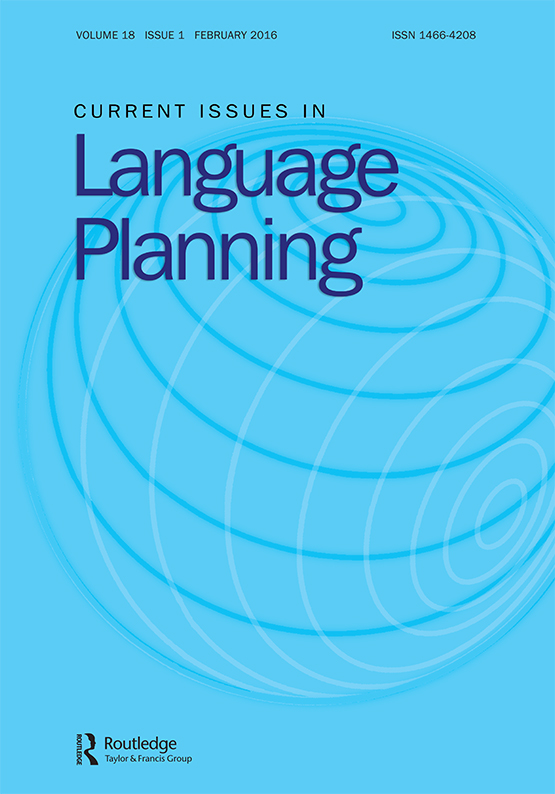
|
Discourses shaping the language-in-education policy and foreign language education in Nepal: An intersectional perspective. Current Issues in Language Planning. 1-19 (ahead of print).
Abstract:
Language policy and planning in Nepal has been contested due to the co-existence of multiple contradictory discourses concerning teaching and learning of local, national, foreign, and international languages. Recently a multilingual policy was issued to create space for the once-banned ethnic/indigenous languages in public schooling, further complexifying the landscape. A few studies have paid attention to teaching and learning of the lesser taught ethnic/indigenous and foreign languages; however, what discursive orientations have contributed towards enabling (or constraining) the use of such languages in education and how have yet to receive scholarly attention. Framed by the perspectives of the intersectionality of discourses, and drawing on in-depth interviews with policymakers, headteachers, teachers, students, and their parents of five schools of Nepal, this paper concludes that the interplay between broader discourses such as globalisation, neoliberal marketisation and nationalism has played a significant role in shaping language policy decisions and localised practice of language(s). It also reveals that the spaces for ethnic/indigenous languages in education are delimited, in preference of English, Nepali, and other emerging foreign languages, leading to their further marginalisation. Such trends diminish the potential use of lesser taught languages, threatening Nepal’s multilingual education policy towards sustaining existing linguistic diversity.
|
Cheng, T. J.,
Jin, J., &
Chen, J.

|
Demystifying subjective well-being of academically at-risk students: A case study in a Chinese high school. Social Inclusion, 9(4), 36-46.
Abstract:
Student subjective well‐being (SWB) is increasingly incorporated into today’s education policies and positive education movements. There is a growing interest in how well schools promote student well‐being, especially for disadvantaged students, e.g., the academically at‐risk, and which factors affect this process. This study investigates how teachers and academically at‐risk students perceive SWB and its influential precursors in a high school in China. The influential precursors in the present research were allocated into four dimensions, namely contextual factors, school factors, family factors, and individual factors. Via semi‐structured individual interviews with 12 teachers and 18 students for about one hour and content analysis of the interview data, the responses revealed that while students tended to have a superficial understanding of well‐being, traditional concepts about studying, blind filial piety, peer relations, and self‐efficacy were important factors shaping and influencing their SWB. These findings can inform the development of inclusive education policies concerning student SWB and the intervention and prevention systems of schools in both local and international contexts. Recommendations for organising lectures for parents and implementing programs providing instruction on SWB‐related skills for students are proposed to support academically at‐risk students, aiming to achieve the educational goal of success for all.
Keywords: Academically at‐risk students; China; Inclusive Education; Sociology of Education; Subjective Well‐being
|
Chong, E. K. M.,
Hu, J.,
Tang, H. H. H.,
Cheng, E.C.K.,
Davies, I.,
Leung, Y. W.,
& Hung, S. C. F.

|
Hong Kong secondary school teachers’ pedagogical approaches to controversial issues at a time of social and political turmoil. Teacher Development. Advance online publication. doi: 10.1080/13664530.2021.1981427.
Abstract:
This research study contributes to understanding teachers’ perceptions and views of using controversial issues and political neutrality in teaching, through an analysis of data gathered through questionnaire responses in a wider project and 41 semi-structured interviews. There are diversified views about the relationship between controversial issues and education. Some teachers feel that it is impossible to avoid controversial issues and that using them is educationally necessary. Three approaches were identified regarding their teaching of controversial issues: ‘open’, ‘critical’, and ‘committed’. The authors argue that teachers’ actions are influenced by factors which are discussed as ‘contextual’, ‘political’, and ‘pedagogical’. Teachers operate in specific places and times, have their own views about the nature of the good society, and prioritize their professional responsibilities. These findings contribute to our understandings of the teachers’ viewpoints and how those views are shaped. Such understandings will contribute to the development of reflective education policy and practice.
Keywords: Pedagogical approaches; Controversial issues; Political Neutrality; Hong Kopng secondary school teachers.
|
Chong, E. K. M.,
Hu, J.,
Tang, H. H. H.,
Cheng, E. C .K., Davies, I.,
Leung, Y. W.,
& Hung, S. C. F.
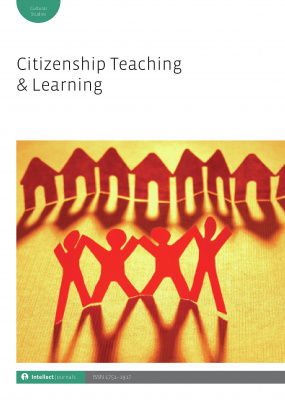
|
Conceptualizing national education and methods of teaching national education in Hong Kong. Citizenship Teaching and Learning, 16(1), 69-94.
Abstract:
This article aims to generate a better understanding of Hong Kong teachers’ perception of national education as implemented in the Hong Kong Special Administrative Region (hereafter referred to as Hong Kong SAR) and the interrelationship between their perception and the methods they adopt to teach the topic. We outline the Hong Kong context relevant to our research and review the relevant literature to consider typologies and teaching methods about and for national education. Questionnaire data focused on the seven typologies of nationalism and the three teaching methods of national education identified in the literature review. A total of 601 questionnaires were returned from 198 schools. The typologies of cultural nationalism, civic and peripheral nationalism, authoritarian nationalism, unification nationalism and cosmopolitan nationalism, and the teaching methods of group discussion and an affective approach characterize the views of Hong Kong secondary school teachers about national education. We suggest that teachers’ diverse views about nationalism and their varied use of teaching methods to achieve their goals suggest the powerful influence of current initiatives from the Chinese mainland and the need to reflect on established academic literature that proposes the decolonization of the curriculum and interactive and critical teaching methods. |
Gümüş, S.,
Hallinger, P.,
Cansoy, R., & Bellibaş, M.Ş.
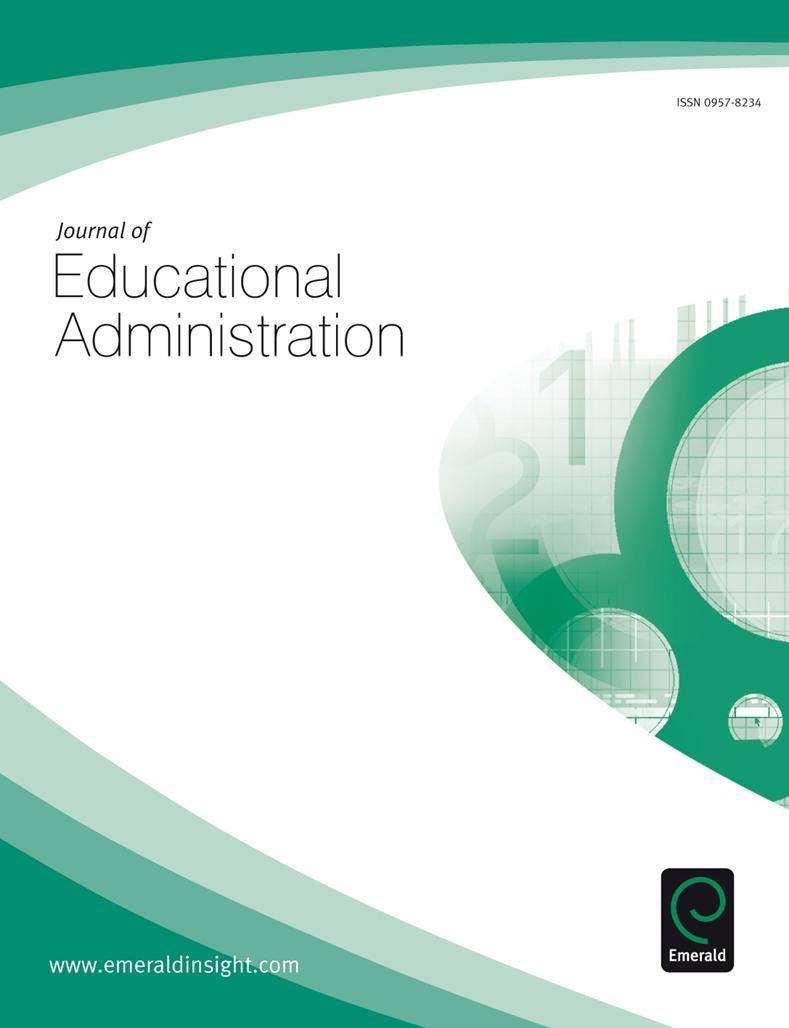
|
Instructional leadership in a centralized and competitive educational system: A qualitative meta-synthesis of research from Turkey. Journal of Educational Adminbistration. https://doi.org/10.1108/JEA-04-2021-0073.
Abstract:
Purpose This study sought to provide an understanding of what a culturally contextualized model of instructional leadership looks like in Turkey, and how this differs from models disseminated in the USA. Design/methodology/approach This study employed qualitative meta-synthesis to systematically review the full set of 22 qualitative studies of instructional leadership in Turkey. A systematic synthesis strategy was applied to code the findings from each study to develop broad themes that describe key domains of principal instructional leadership practice. Findings The results showed that instructional leadership of school principals in Turkey is composed of four main dimensions and ten subdimensions. The main dimensions include: (1) emphasis on national goals and competition, (2) maintaining the learning environment, (3) motivating and enabling teachers, and (4) monitoring program alignment and test results. Research limitations/implications While broad dimensions of instructional leadership described in the international literature are relevant in Turkey, some practices used to enact those dimensions appear poorly aligned with the institutional–cultural context of Turkish schools. Thus, findings from this study support the assertion that the specific practices used to measure, assess and practice instructional leadership must be adapted to the context of a specific society. Originality/value This paper contributes to international efforts to develop a globally validated knowledge base in educational leadership and management.
Keywords: Culturally-relevant Leadership, Instructional Leadership, Meta-synthesis, Turkey.
|
Bellibaş, M. Ş., Gümüş, S.,
& Liu, Y.
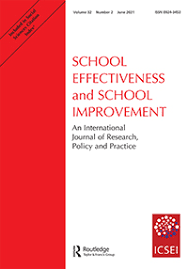 |
Does school leadership matter for teachers’ classroom practice? The influence of instructional leadership and distributed leadership on instructional quality. School effectiveness and school improvement, 32(3), 387-412. https://www.tandfonline.com/doi/full/10.1080/09243453.2020.1858119.
Abstract:
The presented paper aims to examine the influence of principal leadership on teaching practices in order to reveal direct and indirect effects of instructional and distributed leadership models on teachers’ instructional quality, with the mediating effect of teacher collaboration and job satisfaction. This research conducted secondary data analysis using the Teaching and Learning International Survey (TALIS) 2013 dataset collected by the Organisation for Economic Co-operation and Development (OECD). Multilevel structural equation modeling (SEM) was applied to the analysis of the data. The results suggested a significant direct effect of principals’ instructional leadership on instructional quality, while the effect of distributed leadership was mainly indirect, mediated by teacher collaboration and job satisfaction.
Keywords: Distributed Leadership, Instructional Leadership, Instructional Quality, TALIS
|
Ho, C. S.,
& Man, T. W. Y.
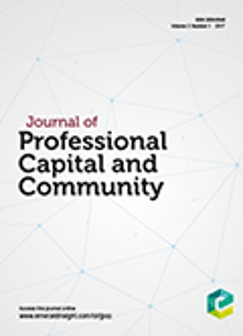 |
The conditions of opportunity recognition in schools: An investigation of how entrepreneurial teachers discover new educational opportunities. Journal of Professional Captial and Commuity. https://doi.org/10.1108/JPCC-04-2021-0022.
Abstract:
As scientific knowledge creates new opportunities for human advancement, schools have a responsibility to seize such opportunities by preparing students for the future (OECD, 2018). Moreover, in addition to school principals, teachers should also seek opportunities to prepare their students for the future (Holloway, 2019; OECD, 2018). To effectively pursue this responsibility, educators need to discover the opportunities that help them embrace innovation (Pietsch et al., 2020). Teachers, who engage in innovative activities can acquire concrete motivation, a clear purpose and a complete project identity for school improvement (Lu and Campbell, 2020). This also allows them to continuously create and exploit innovative ideas for student achievement (Day et al., 2011; Robinson et al., 2008). As opportunity recognition plays a crucial role in sustaining innovation in educational organizations (Ho et al., 2021), interest in teacher's entrepreneurial behavior (TEB) studies has grown rapidly in recent years (Kurniawan et al., 2017; Van Dam et al., 2010). TEB refers to teachers' enactment of a series of competencies and attributes that enable them to seize opportunities to scale up innovation in schools (Ho et al., 2021). Therefore, studying TEB can contribute to understanding how teachers seize opportunities to actualize the innovations that are beneficial to school improvement. A lack of understanding the conditions of opportunity recognition can affect how schools sustain their continuous improvement, including providing relevant support to teachers and being successful over the long-term (Miller and Szymusiak, 2021). Thus, it appears timely to investigate the motivation for opportunity recognition in schools. Accordingly, the research question guiding this study is: “What are the conditions that facilitate ETs to recognize opportunities for sustainable school improvement?”
To answer this question, we first provide a review of the literature on TEB, opportunity recognition and the conditions for opportunity recognition as they are connected to discovery theory. Although TEB studies seldom demonstrate how school conditions help teachers identify opportunities, Ho et al. (2020) in a recent study on the impact of TEB, revealed that teachers can recognize innovative teaching opportunities with the guidance of team members. Ho et al.’s study sheds light on TEB research by empirically exploring how ETs recognize opportunities through the application of discovery theory. Our study adopts a qualitative approach using in-depth semi-structured interviews to dig deeper into teachers' perceptions of how they recognize opportunities. It also serves as a springboard to further our understanding on how to motivate teachers to seize innovative educational opportunities.
|
Zheng, M.,
Walker, A, &
Qian, H-Y.
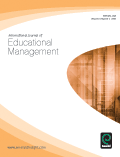
|
Master teachers as system leaders of professional learning: Master teacher studios in China. International Journal of Educational Management. https://doi.org/10.1108/IJEM-04-2021-0127.
Abstract:
Purpose This study aims to describe and analyze an innovative mechanism of teacher-led, system-wide professional learning that has been widely adopted since the beginning of the twenty-first century in China – the Master Teacher Studio (MTS).
Design/methodology/approach This paper drew from policy documents, published Chinese literature relating to MTSs and personal fieldwork experience in Shanghai, Guangdong and Zhejiang province.
Findings The article first outlines the context framing the system change, including its policy background and evolution, and then the MTS's purpose, formative process and structure. It finally examines major teacher learning activities and the leadership roles of the MTS hosts (leaders).
Research limitations/implications This study contributed to the knowledge base of system teacher leaders and how they lead cross-school leading. Practical implications The MTS initiative described in this article shows the power of central system leadership to spread and embed effective teacher learning practices at schools.
Originality/value This article provides implications for understanding and practicing teacher system leadership to support teacher professional learning in different societies.pment. |
Bryant, D. A.,
& Walker, A.
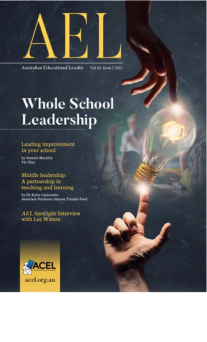
|
Whole-school Designs that Develop Middle Leadership Capacity. Australian Educational Leader, 43(2), 24-28.
Abstract:
This article discusses three models designed by school leaders to support the development of whole-school leadership capacity. The models suggest structural options by which principals can provide ongoing middle leadership development opportunities while maintaining focus on school-wide initiatives. The research underpinning these models comes from international and local schools in East Asia.
|
Ying, M.,
& Wright, E.
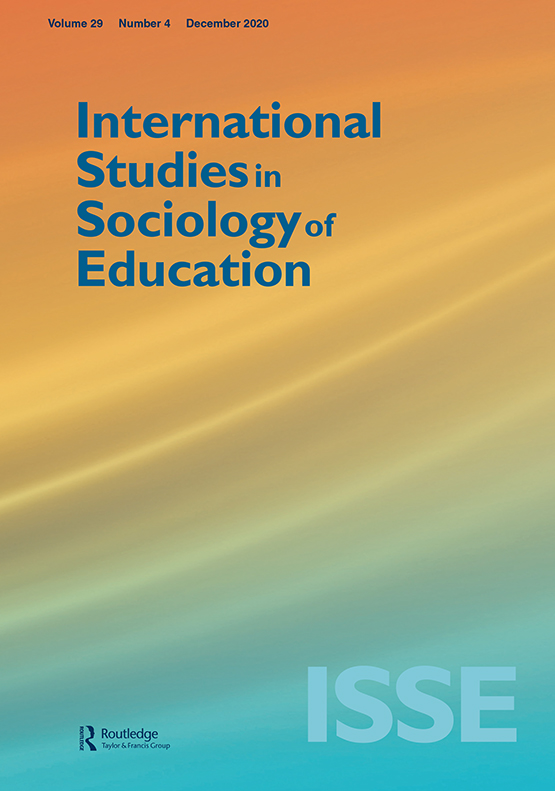
|
Outsourced concerted cultivation: International schooling and educational consulting in China. International Studies in Sociology of Education. https://doi.org/10.1080/09620214.2021.1927143.
Abstract:
This article examines the strategies of a ‘new rich’ class in China to transmit advantages to their children through admission into highly ranked overseas universities. In-depth interviews were conducted with parents (n = 16) and students (n = 60) at international high schools that cater to the local population in Shenzhen. The findings demonstrate how ‘new rich’ parents, who lacked knowledge or experience with international higher education, sought to convert their newly acquired wealth into cultural competencies for their children’s overseas university applications. Specifically, the parents were shown to ‘outsource’ concerted cultivation to international schools and educational consultants as presumed experts. The research implications are discussed regarding (1) the significance of economic resources to ‘purchase’ concerted cultivation in education markets, (2) how ‘outsourcing’ concerted cultivation did not spare the parents heightened anxiety about their children’s education, and (3) the consequences of ‘over-involvement’ in students’ university application for equity and fairness in international higher education.
Keywords: Concerted cultivation, Social Reproduction, International Schools, Educational Consulting, University Applications.
|
Wright, E.,
Feng, S.,
& Zheng, Y.
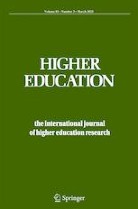
|
Unemployed graduate to the next Jack Ma? A counter-narrative to the entrepreneurship movement in higher education. Higher Education The International Journal of Higher Education Research. https://doi.org/10.1007/s10734-021-00709-4
Abstract:
An entrepreneurship movement has advanced into higher education. There is a growing expectation that universities demonstrate an economic contribution to the public good by instilling students with entrepreneurialism and providing guidance for starting businesses. In China, the state has launched a ‘Mass Entrepreneurship and Innovation’ initiative as part of a national development strategy, which required universities to increase resources for entrepreneurial activities and for all students to complete an entrepreneurship education course. This article applies new institutionalism theory to illuminate how the mass entrepreneurship initiative filtered down to universities and students. Data were analysed from policy documents and interviews (n = 100) with final-year undergraduates in the social sciences and humanities at two public universities in Guangdong Province. The universities were found to conform ceremonially to the institutionally legitimated initiative, but entrepreneurship provisions for undergraduates remained limited. At the same time, mass entrepreneurship was found to be disconnected from student experiences. One group (the ‘avoiders’) perceived entrepreneurship as unfeasible or a remote possibility in their lives. A second group (the ‘venturers’) were unprepared for starting a business and described hardships resulting from their failures. The findings provide a counter-narrative to the entrepreneurship movement and raise ethical questions about the mass promotion of entrepreneurship to students without due consideration to the risks.
|
Qian, H. Y.,
& Walker, A.
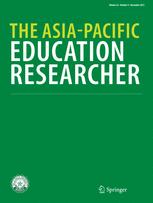 |
Building emotional principal-teacher relationships in Chinese schools reflecting on paternalistic leadership. The Asia-Pacific Education Researcher, https://doi.org/10.1007/s40299-021-00563-z.
Abstract:
Leadership is enacted through relationships. Relationships between leaders and followers entail building emotional connections. A successful leader facilitates and supports mutually beneficial relationships with teachers, students and other community members. They do this through displaying high levels of emotional competence, confidence and empathy. Using data collected from 101 primary school principals from six Chinese provinces, this paper explores how principals build reciprocal relationships with teachers via the display and enactment of paternalistic leadership. That is, the principals adopted a paternal leadership approach where they provided protection and care for teachers’ professional and personal lives while maintaining high expectations of quality teaching and cultivating a shared understanding of what teachers should and should not do. Many of the principals managed to win trust from teachers, which appeared to signify a strong personal bond founded on positive emotions. As such, the study provides an empirical basis to reflect and revisit the concept of paternalistic leadership and relationship between culture, leadership and emotional relationships.
Keywords: China, Emotion, Relationship, Paternalistic Leadership.
|
Chen, J.,
Berkovich, I.,
& Eyal, O.

|
School leaders’ emotional experiences: Perspectives, challenges, and prospects. The Asia-Pacific Education Researcher,
https://link.springer.com/article/10.1007/s40299-021-00564-y.
Abstract:
In the existing literature of knowledge exchange (KE) and higher education, there is limited but emerging cluster of research which undertakes a comprehensive analysis of various types of higher education institutions and patterns of KE engagement. Employing the empirical example of Hong Kong, this paper examines the interconnections between institutional types and patterns of knowledge exchange (KE) activities in the context of a global city. It found that during the short history of KE policies and activities, all public universities in Hong Kong have been building their capacities for this new intellectual premise in the last decade. Meanwhile, disciplinary comprehensiveness and research/education intensity of the universities affect their institutional responses to the global trend of KE. The typology of higher education institutions suggested by this paper puts forward a perspective to further understand the institutional patterns of KE in the twenty-first century.
Keywords: Institutional Types in Higher Education, Knowledge Transfer, Third Mission, Public Good, Entrepreneurial Universities
|
Jiang, Y.,
Lee, J.C-K.,
Wan, Z.,
& Chen, J. S.
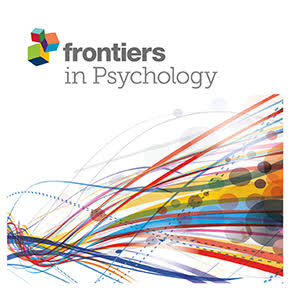
|
Stricter teacher, more motivated students? Comparing the impacts of teacher behaviours on the motivational beliefs of western and East Asian learners. Frontiers in Psychology (Educational Psychology). https://doi.org/10.3389/fpsyg.2020.564327.
Abstract:
Teacher behaviors are one of the most significant factors influencing student learning. Students from different cultures may have different interpretations of their teachers’ behaviors. This study compared the associations between teacher strictness, teacher feedback, and students’ motivational beliefs using data from six Western countries (the United States, the United Kingdom, Finland, Norway, Australia, and New Zealand) and six East Asian regions (Japan, Korea, mainland China, Hong Kong, Macau, and Taiwan) in the Program for International Student Assessment (PISA) 2015. A total of 89,869 15-year-old students were included in data analysis. The findings indicate that (i) teacher strictness was negatively associated with Western students’ motivation, but positively related to that of East Asian students; (ii) teacher feedback had significant positive associations with the motivational beliefs of both Western and East Asian students; and (iii) there was a positive relationship between teacher strictness and teacher feedback in East Asian context. These results highlight the need to consider cultural factors when interpreting students’ reactions to teacher behaviors.
|
Chen, J.,
& Cheng, T.
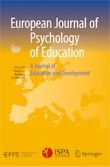
|
Review of research on teacher emotion during 1985–2019: A descriptive quantitative analysis of knowledge production trends. European Journal of Psychology in Education. https://doi.org/10.1007/s10212-021-00537-1.
Abstract:
This current review of research tells a richly detailed story of the evolving intellectual structure of teacher emotion research during 35 years starting from 1985 until 2019, through identifying 812 articles and using a descriptive quantitative analysis approach. The developmental trend reveals a substantial change in the volume of publications recently, although the overall volume of research is still relatively low. Findings identify that, although quantitative methods were the most commonly used, qualitative and mixed methods of research have undergone a marked increase in the past ten years. However, as the majority of articles have been exploratory-oriented, intervention and experimental studies are largely lacking, resulting in the “so-what” story being missing. A functionalist perspective suggests that knowledge production in teacher emotion research is either at a late first stage or an emerging second stage. This effort lays a foundation on which to interpret the evolution of the teacher emotion literature. |
Wright, E.,
& Lee, M.
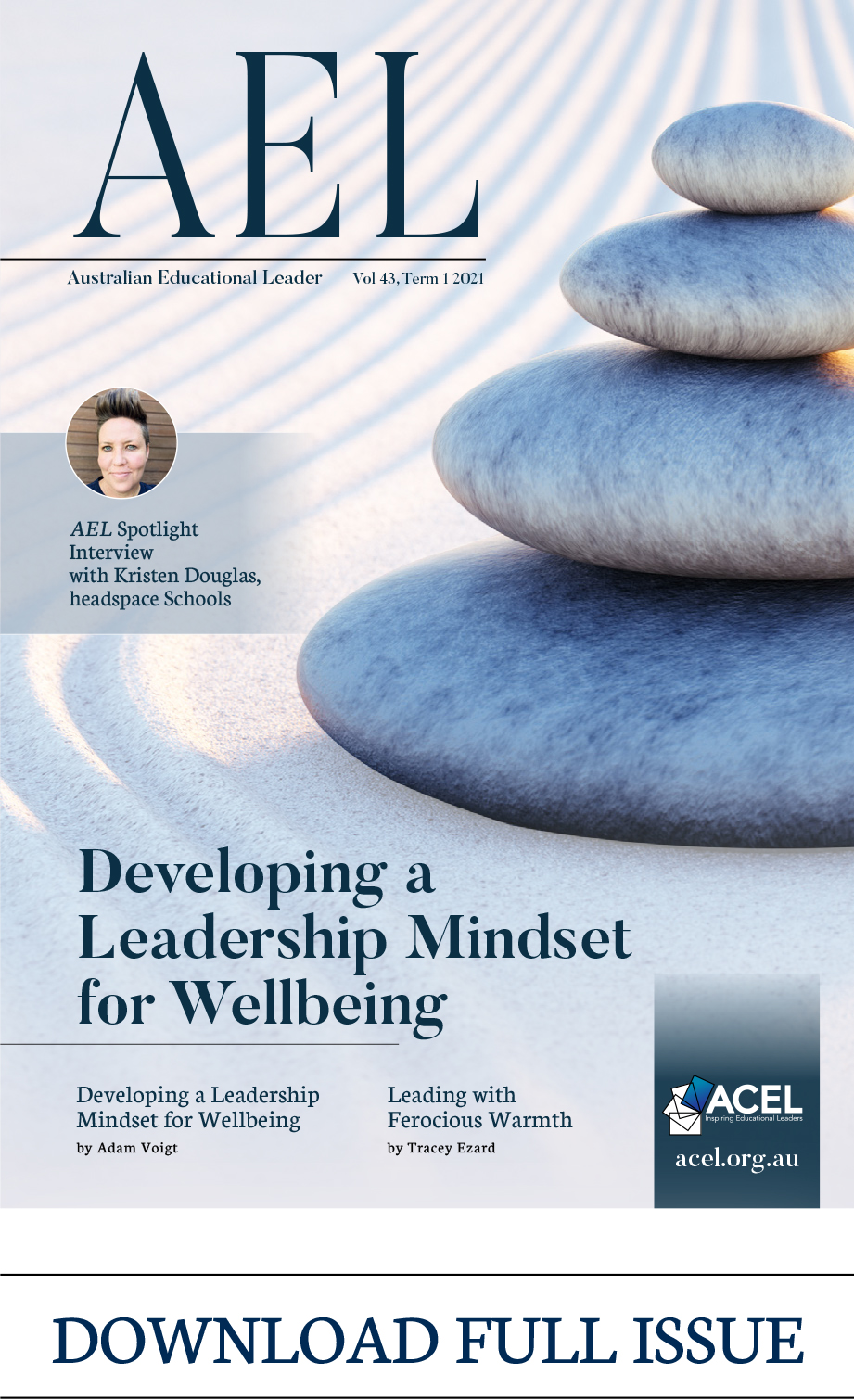
|
Leading with teacher emotions: establishing a school well-being cascade. Australian Educational Leader, 43(1), 37-39.
Abstract:
As one of the crucial essences of teacher wellbeing, teacher emotions have been strongly advocated to school leaders by Leithwood and Beatty (2008) back 12 years ago. However, it has not been given sufficient attention until the last recent couple of years. It is welldocumented that teaching is a high-risk profession worldwide (Capone & Petrillo, 2020). Emotions hover like a shadow over the lives and work of teachers which inevitably destruct their well-being, teaching quality and effectiveness (Chen, 2020a). At other times, teacher emotions are highly restrained and influenced by collegial competition, standardised performativity, increasing accountability, and instant appraisal (Acton & Glasgow, 2015). For example, Näring, Vlerick, and Van de Ven (2011) warned that “the work of teachers is being evaluated in more and more detail and this has also led to an increase in the emotional demands of teaching” (p. 12). Whilst in the ‘undeniable chaos’ defined by Hargreaves and Fullan (2020), the pandemic of COVID-19 has dramatically changed and disrupted teacher professional life, such as dealing with new teaching mode, new technologies, unpredicted uncertainties, and new demands in isolation (Hattie, 2020). All of these inevitably have made teachers even more emotionally vulnerable (Asbury & Kim, 2020). Therefore, the COVID-19 pandemic has created an unprecedented environment that intellectually, emotionally and practically challenge how principals function their schools. It is now the time that school principals need to re-position their work and turn ‘on its axis’, in order to maintain schools functioning and possibly move their schools forward during this turbulent time (Harris & Jones, 2020). Meanwhile, principals need to also pay attention to their teacher emotions in order to maintain and possibly enhance teacher wellbeing, as they are the first-line agents who are critical in influencing changes as expected. Due to the significance of teacher emotions to their well-being, the aim of this paper is to portray a picture on how school principals can establish a school well-being cascade through the lens of teacher emotions.
|
Wright, E.,
& Wei, H
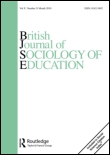 |
Internships and the graduate labour market: How upper-middle-class students get ahead. British Journal of Sociology of Education, https://doi.org/10.1080/01425692.2021.1886051.
Abstract:
Internships have become an important means to enhance career prospects in an increasingly congested graduate labour market. This article used positional conflict theory to explore how university students from different social class backgrounds experience internships, and the implications for inequalities in post-graduation employment. One-hundred interviews were conducted with final-year undergraduates from three different class fractions at a Russell Group university (n = 50) and a Post-1992 university (n = 50) in England. This research design enabled the exploration of differences between the most socio-economically privileged students and others, independent of university attended. The findings demonstrated how upper-middle-class students at both universities were better able to mobilise family resources to progressively ‘stack’ multiple and ‘high-status’ internships, resultantly pulling away from their peers in preparing for the graduate labour market. It is argued that internships have emerged as a class strategy to ‘get ahead’ beyond the well-established mechanisms of elite universities and prestigious fields of study.
Keywords: Higher Education, Graduate Labour Market, Internships, Social Classhina
|
Lee, M.,
Kim, H.,
& Wright, E.

|
The influx of International Baccalaureate (IB) programmes into local education systems in Hong Kong, Singapore, and South Korea. Educational Review, https://doi.org/10.1080/00131911.2021.1891023.
Abstract:
This comparative analysis aims to capture the complex roles and positionings of the International Baccalaureate (IB) in conjunction with local education systems in Hong Kong, Singapore, and South Korea. Our analysis focused on how the IB’s institutional legitimacy is presented in the three societies. We conducted a documentary analysis of texts on the introduction and implementation of IB programmes into local school systems. Our findings suggest that there are commonalities and variations in how the IB is interpreted by key local agents and is positioned into local education systems. Specifically, across the three societies, the IB has expanded continuously. At the same time, its institutionalisation process varies by each society’s socio-historical context and needs: substantive legitimacy as the international curriculum of choice in Hong Kong, a quiet supplement to elite education in Singapore, and instrumental curriculum borrowing for fixing the education system in Korea. We also find that the institutionalisation of the IB is limited at a symbolic level and controlled by the Singaporean government, while the IB is saliently promoted by local education authorities in the context of education reform in Korea. The institutionalisation process of the IB in Hong Kong is primarily swayed by market principles under the existing school choice system.
Keywords: International Baccalaureate (IB), Local Education Systems, Institutionalism, Legitmacy, Comnparative Analysisced. |
Lee, M.,
Ryoo, J. H.,
& Walker, A.
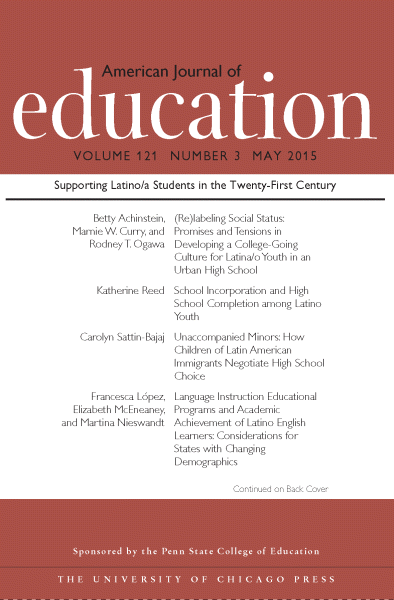 |
School principals’ time use for interaction with individual students Macro contexts, organizational conditions, and student outcomes. American Journal of Education, 127. https://www.journals.uchicago.edu/doi/pdf/10.1086/712174.
Abstract:
To test emerging narratives of principals’ direct effect on student outcomes on a large scale, this study investigates whether school principals’ time use for interacting with individual students is associated with academic achievement and student safety at school. Built on recent research on principals’ time use, this study explores whether economic, sociocultural, and institutional features of societies influence the amount of time principals spend interacting with individual students. This time use, in turn, is assumed to be associated with academic achievement and safety at school. To explore the linkages, the study utilizes the Progress in International Reading Literacy Study (PIRLS) with multilevel modeling. Implications of the findings are offered for an emerging inquiry on principals’ direct effect on student outcomes and for US education policy.eadership
|
Walker, A.,
& Qian, H-Y.

|
Emotional trajectory at different career stages of principalship: A perspective from excellent principals. Educational Management Administration & Leadership. https://journals.sagepub.com/doi/full/10.1177/1741143220985300.
Abstract:
Emotions hover like a shadow over the lives and work of school principals. This study aimed to build an understanding of principals’ emotional trajectories across principalship career stages by investigating the life stories of four excellent principals from China who were approaching retirement. The major data source was semi-structured interviews conducted with the participating principals. This study is a first to attempt to capture the dynamic emotional trajectory of excellent principals. The results show that the principals experienced more negative emotions than positive emotions during the earlier stages of their careers, but fewer negative and more positive emotions during the later stages. The principals tended to adopt genuine expressions throughout their principalship in order to achieve desirable consequences. They were more likely to utilise surface acting strategies during earlier career stages, but more deep acting strategies to achieve emotional consonance later in their careers as they became more confident about accomplishing professional goals. The study offers fresh insights into principals’ emotional trajectories. The findings aim to better inform principals, scholars and policy makers about the place and shape of principal emotional leadership.
Keywords: Principal Emotions, Stages of Principalship, Qualitative, Emotional Trajectory, Excellent Principal |
Qian, H- Y.,
& Walker, A.
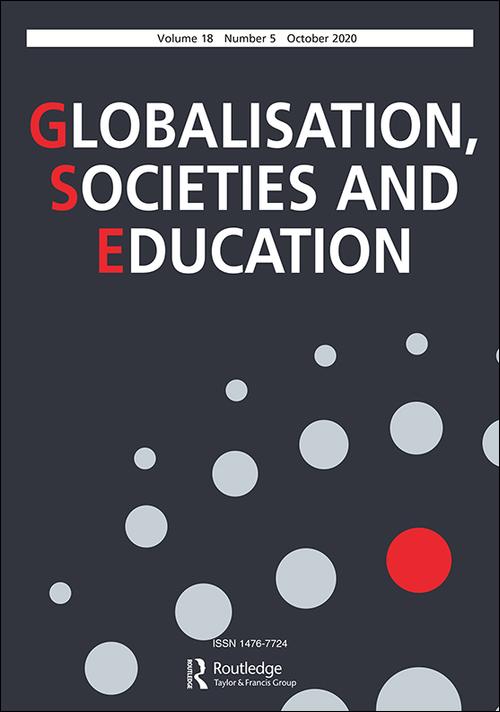
|
Experiments in being global: The cosmopolitan nationalism of international schooling in China. Globalisation, Societies and Education, https://doi.org/10.1080/14767724.2021.1882293.
Abstract:
This research applies the analytical lens of ‘cosmopolitan nationalism’ to examine how ‘non-traditional’ international high schools interweave cosmopolitan and nationalistic tendencies in Shenzhen, China. In-depth interviews with parents (n = 16) and students (n = 60) explored the motivations for choosing international schooling, experiences of international schooling, whether cosmopolitan identities are emerging amongst students and, if so, with what characteristics. The findings demonstrate the utility of ‘cosmopolitan nationalism’ in illuminating the nature of international schooling in China and extends it by applying it to denote the identities expressed by students, who confidently project the national into the global with their expectations for the future.
Keywords: International Schooling, Cosmopolitanism, Nationalism, Identity, China. |
Choi, T-H.,
& Chiu, M. M.
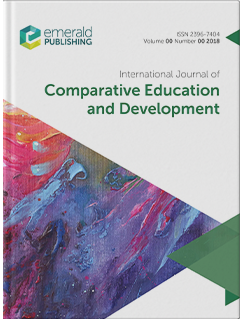
|
Toward equitable education in the context of a pandemic: Supporting linguistic minority students during remote learning. International Journal of Comparative Education and Development. https://www.emerald.com/insight/2396-7404.htm.
Abstract:
Purpose - Without universal access to a Covid-19 vaccine, many countries seek to prevent coronavirusoutbreaks by closing schools and having students learn remotely. This study aims to examine its challenges forlinguistic minority (LM) students and some practical strategies–both generally for all students and specificallyfor LM students.
Design/methodology/approach–This study synthesises the research literature and practices acrosscountries on equity and remote learning. It helps (1) understand the differential difficulties during an epidemicacross primary, secondary and tertiary school students, especially LM students from low socioeconomic status(SES) families who lack economic, human, cultural or social capital in family or school contexts, based onBourdieu’s theory, and (2) identify additional resources and flexible, creative solutions for improving accessand learning conditions for LM students. The authors discuss examples from 13 countries and territories(including developed and developing economies) of transformations of in-class learning to online learning inpart or whole.
Findings–The limited economic, cultural and social capital of LM students, especially from low SES families,and their schools, along with communication barriers hinder their remote learning. Crisis-induced schoolbudget shortfalls require creative ways to transition teachers, students and parents to remote learning and toprovide customised support for LM students. Schools can (1) partner with non-governmental organisations,religious organisations, businesses and government services to access/share remote learning resources for LMstudents; (2) help teachers, students and parents develop needed skills (via online systems, peer support groupsand hotlines); (3) restructure teacher lessons and duties for remote teaching; and (4) capitalise on technology(e.g. texts, chats, whiteboards) to support LM students’remote learning–some of which can exceed theirtraditional face-to-face learning experiences. Originality/value–This article is among the first to examine how the Covid-19 crisis disproportionatelyaffects the remote learning of LM students, to specify effective, practical remedies and to inform suitableeducation and social policies across countries.
Keywords: Coronavirus/COVID-19, Capital (economic, cultural, Social), Equity, Language minority students,Remote learning, Online learning. |
Cheng, T.,
Chen, J.,
& Bryant, D. A.

|
Teacher leaders’ emotions mirror teacher professionalism via collegial trust. The Asia-Pacific Education Researcher. https://doi.org/10.1007/s40299-021-00551-3.
Abstract:
The current study explores teacher leaders’ emotions and its relationship with teacher professionalism and collegial trust in the Chinese context. A sample of 477 teacher leaders in China responded to three measures, namely, teacher leader emotions, teacher professionalism and trust in colleagues. To analyse the data, confirmatory factor analysis and structural equation modelling were utilised. The results confirmed three hypotheses on the relationships between three constructs. Specifically, positive emotions (e.g., pride and love) from teacher leaders positively and significantly affected their trust in colleagues. Moreover, enjoyment positively affected, and fatigue and anxiety negatively affected, teacher professionalism. The structural model showed that enjoyment, anxiety, and fatigue of teacher leaders directly affected teacher professionalism but pride and love indirectly affected teacher professionalism mediated by their trust in colleagues. It is also interesting to note that pride negatively affected teacher professionalism through collegial trust. Implications and future directions are proposed in the form of theory and practice. |
Ho, C. S. M.,
Lu, J.,
& Bryant, D. A.
 |
Understanding teacher entrepreneurial behavior in schools: Conceptualization and empirical investigation. Journal of Educational Change. https://link.springer.com/article/10.1007/s10833-020-09406-y.
Abstract:
The quasi-market condition of education intensified the need to seek ongoing school improvements, manage uncertainty, and innovate school-wide pedagogy and curricula. Sequentially, interest in teachers’ entrepreneurial behavior (TEB) has grown rapidly in recent years, which established the importance of entrepreneurial behavior as an effective response to the changing, uncertain, and increasing demanding context in the education system. However, the notion of TEB has not been clearly conceptualized or operationalized. This study attempted to offer a clear definition of TEB and identify its conceptual components. We first offered a semi-systematic literature review of entrepreneurial behavior, and then conducted a multiple-site case study at three schools in Hong Kong. We identified three competency components and three attribute components of TEB, from which we established a conceptual definition of TEB. This clarification of TEB and its components enabled the linkage to prior literature and future research.
|
Chen, J.
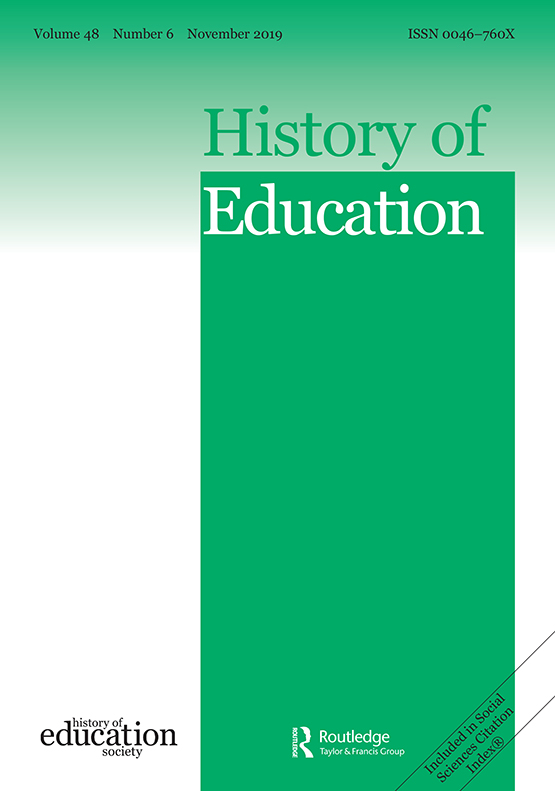 |
English fever: Educational policies in globalised Korea, 1981-2018. History of Education, doi:10.1080/0046760X.2020.1858192.
Abstract:
This paper explores the relationship between education policy and the trajectory of English fever in Korea. English fever refers to a fervent desire to become proficient in English at almost any cost. English fever started with the governments’ globalisation efforts in the 1980s and further intensified in the aftermath of the 1997 Asian financial crisis. Drawing on policy enactment theory and analysing policy documents, this paper shows how English fever, once having taken roots in Korean society, defied all policy measures to tackle it. The English language having a close relationship with social equity, these policies pursued an additional aim of increasing educational equity for students from low-income families. Their impact, however, proved minimal, partly due to educational stakeholders’ resistance. In order to relieve pressure on students, presidents Pak Geun-hye and Mun Jae-in tried to decrease the strong emphasis on English in curricula during the last decade.
|
Poudel, P. P.,
& Choi, T-H.
 |
Policymakers' agency and the structure: The case of medium of instruction policy in multilingual Nepal. Current Issues in Language Planning, 22(1-2), pp, 79-98. https://www.tandfonline.com/doi/full/10.1080/14664208.2020.1741235.
Abstract:
The medium of instruction (MOI) has been a contested issue in multilingual polities globally, as English medium of instruction (EMI) has seen unprecedented growth, threatening the use and sometimes very survival of local/indigenous and even national languages. While the struggles to address related issues have been well researched, how and why local level policymakers enact the well-meant national policies in a way that marginalises indigenous languages and expands EMI has yet to receive due attention. The research is scarce especially when language policy and planning (LPP) is dealt with as part of overall educational governance. Drawing on in-depth interviews with senior policymakers in two similar constituencies in Nepal, and appropriating David Block's agency framework [(2012). Unpicking agency in sociolinguistic research with immigrants. In S. Gardner & M. Martin-Jones (Eds.), Multilingualism, discourse, and ethnography (pp. 47-60). Routledge.], the paper shows the elements of structure that enable or delimit the decision-making of different policymakers concerning the MOI. While professing multilingualism as their ideal language policy, the policymakers are designing policies that sideline indigenous languages. This unintended outcome results from dealing with diverse aspects of structure, i.e. history, physical and imagined spaces, culture, and discourses around languages. Though situated within Nepal, the discussion has wider implications for understanding agentive acts in this globalising world and for LPP as part of general educational policymaking.
|
Lam, B .O. Y.,
& Tang, H. H. H.
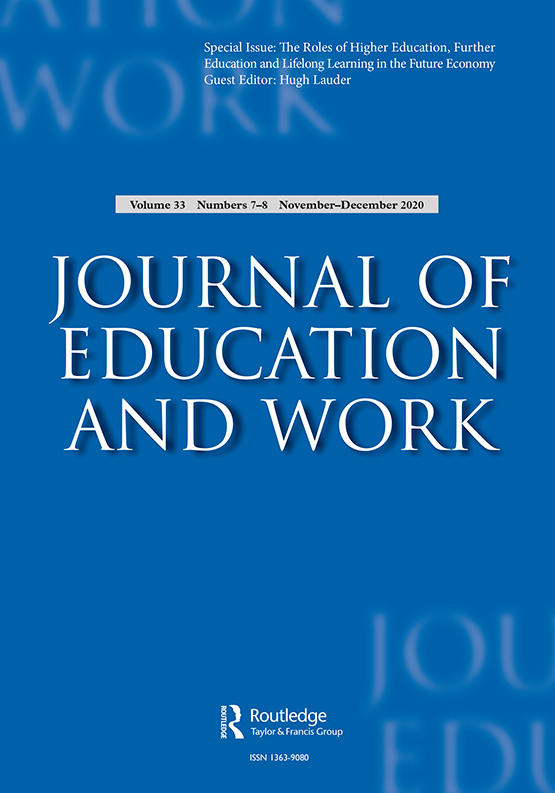 |
Making sense of ‘graduate employability’ in Hong Kong: a contextualized analysis of experience and interpretations of graduates of self-financing higher education institutions. Journal of Education and Work, 34(1), 14-28.
Abstract:
Declining employment prospects of graduates have been reported in the international literature and in Hong Kong. This casts doubts on the ‘employability’ of graduates of an expanding higher education sector. Yet, published patterns and trends of graduate employment outcomes do not tell us much about the contextualised processes that ‘match’ or ‘mismatch’ graduates’ qualifications with ‘appropriate’ graduate jobs. This paper addresses this research gap through examining lived experience and subjectivities of college/university-to-work transition of 10 graduates of self-financing degree-awarding institutions in Hong Kong, which were derived from a study of 40 local young workers in 2018. Drawing upon ‘positioning’ and ‘processual’ perspectives on ‘employability’, this paper sheds light on the nebulous, mutually constituted nature of the skills demanded by employers in workplace. Also, highlighting the tensions discerned in interview narratives, it elucidates the difficulties for graduates to present their skills as ‘directly’ transferable to the workplace. Graduates’ interpretations of (their) ‘employability’ reveal the differential values attached to (‘technical’ vs. ‘non-technical’) skills, (degree vs. sub-degree) qualifications and (self-financing vs. publicly funded) institutions constructed in the specific context of local higher education development. Implications for further research, assessment of higher education functioning and career services are discussed.
Keywords: Graduate Employability, College/university-to-work, Transition, Self-financing, Higher Education, Workplace, Hong Kong
|
Szeto, E.,
Sin, K.,
& Leung, G..
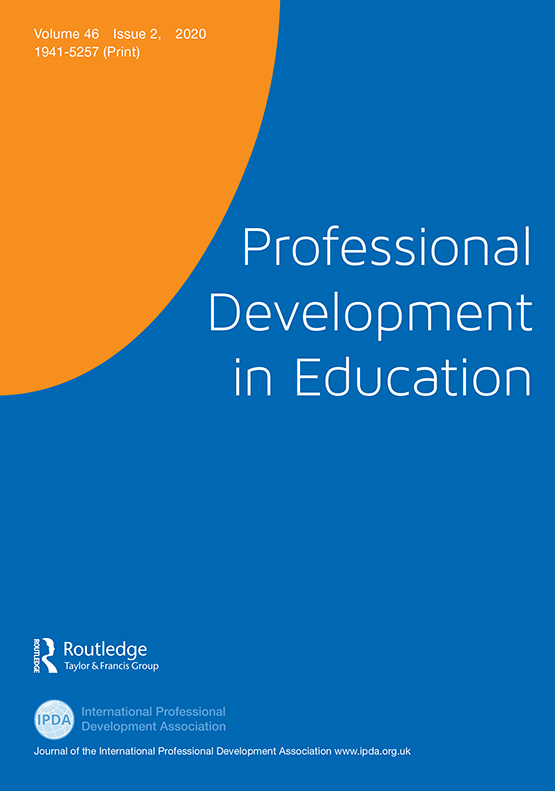 |
A cross-school PLC: How could teacher professional development of robot-based pedagogies for all students build a social-justice school?
Professional Development in Education, 47(1), 141-155.
Abstract:
This paper aims at extending the understanding of principal leadership in support of teachers' development of robot-based pedagogy for students in a cross-school professional learning community (PLC) of Hong Kong's special education. Sixty representative teachers from over 30 special schools, that is 50% of the total number of special schools, participated in the community over the past 2 years. The teachers not only developed the pedagogy but also observed and collaborated in the schools regarding their technological, pedagogical and content knowledge. The development of robot-based learning for individual students' different special educational needs is an innovative differentiated approach to fostering socially just learning in schools. The key research question is: How could teacher professional development of robot-based pedagogies for all students build a social-justice school? We adopted a qualitative cross-case study of four schools participating in the PLC. Although the professional development did not aim at principals' and teachers' social-justice practices for all students, the case study demonstrated the principals' leadership support and the teachers' enthusiasm for learning to change their pedagogies with the use of new robotic technology for socially just differentiated teaching. Implications of the cross-school PLC for building social-justice school communities are also discussed.
|
Lee, M.,
Kim, J. W.,
Walker, A.,
Bryant, D. A.,
& Mo, Y.
(in press).

|
Development, validation and application of Professional Learning Community (PLC) instruments. Journal of Educational Administration.
|
So, W. M. W., Cheng, N. Y., Lee, T. H., & Li, W. C. (in press).

|
Teachers’ professional development with peer coaching to support students with intellectual disabilities in STEM Learning. Education Technology & Society (Special Issue: Teacher Professional Development in STEM Education).
|
| |